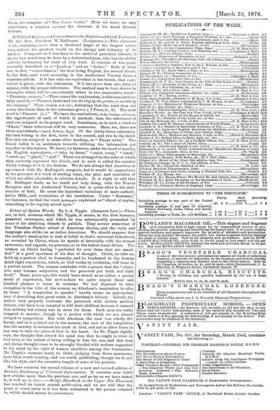A Critical Lexicon and Concordance to the English and Greek
Testamen By the Rev. Ethelbert W. Bullinger. (Longmans.)—This elaborat work, containing more than a thousand pages of the largest octav size, reflects the greatest credit on the energy and industry of i author. Composed as it has been in the midst of parochial labours, shows how much may be done by a determined man, who has the abilit and the inclination for work of this kind. It consists of two part severally described as a "Lexicon " and an " Index." Both of the are, in fact, "concordances," the first being English, the second Gree In the first, each word occurring in the Authorised Version forms separate article. If it has only one equivalent in the Greek, that equi valent is given, with the references. If it has more than ono, then al appear, with the proper references. The method may be best shown b examples which will be conveniently taken in two consecutive words " FEIGNED, vaerr4."—Then comes the explanation, in this case particu larly needed,—" Formed, fashioned (as the clay by the potter, or marble b the statuary?' Then comes non occ., indicating that the word does no occur elsewhere than in the reference given ( 2 Peter, ii., 3). The nox word is " FELLOW. (s.)" We have the equivalents, emit, l'rearg, pi.rozo the significance of each of which is marked; then the references o each are assigned to its proper word. Sometimes, as in such a word a "Dun'," these references will be very numerous. Here, too, there ar three equivalents,—i•peri, S•xti. Of the thirty-three reference thirteen belong to the first, three to the second, and two to the third The rest are assigned to some other heading, as " FEAST wins." Th Greek index is an assistance towards utilising the information pu together in this lexicon. We have, for instance, under the head of le.psre4o, six English equivalents,—" take by force," "catch away," "catch,' "catch up," " pluck," " pull." These are arrangedin the order of whic they correctly represent the Greek, and to each is added the numbs which belongs to it in the lexicon. We do not always find ourselves i agreement with Mr. Bullinger's exegesis, but it would be ungracious in the presence of a work of sterling value, the plan and execution o which are alike admirable, to criticise details. It is right to add the Mr. Bullinger deals, as he could not help doing, with the Texts Receptus and the Authorised Version, but is quite alive to the deli ciencies of both. He notes the important variations of more authori tative MSS., and corrections of the translation. Under " ROBBERY,' for instance, we find the word leegreyph explained as " object of rapine something to be eagerly seized upon."


































 Previous page
Previous page